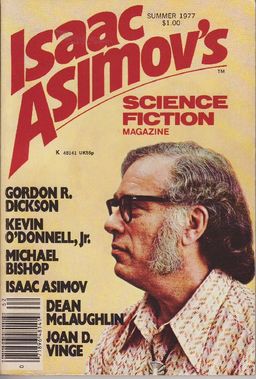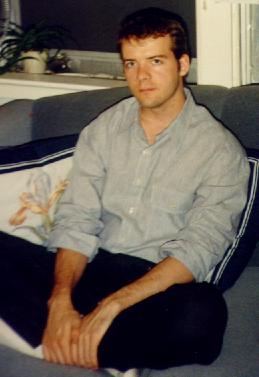Fantasy Keeps You Young

Some years before I started Black Gate magazine, I was editing a science fiction fan site called SF Site. It’s still going strong today, managed by my old partners Rodger Turner and Neil Walsh in Ottawa. It was nominated for a Hugo award in 2002, and a World Fantasy Award in 2006; in 2002, it won the Locus Award for best webzine.
Anyway, before all that fame and glory, I was still struggling to get the damn site off the ground. That meant a lot of hard work, writing and posting articles that nobody read, late into the night. Around 1997 or so, I hit on an idea to give my site a higher profile: offering free hosting to the major SF and fantasy magazines, none of which had websites at the time. This worked splendidly, and over the next few years, Rodger and I launched sites for Analog, F&SF, SF Chronicle, and many others (meaning that I made a lot of phone calls, and Rodger did all the actual work.)
In 1998, shortly after we launched the Asimov’s SF site, I wrote A Brief History of Asimov’s Science Fiction Magazine, to celebrate the magazine coming on board. I wrote about finding the second issue in 1977, the summer I discovered SF magazines. In my first draft, I said something about Asimov looking elderly and distinguished on the cover.
I ran the draft past Sheila Williams, then Executive Editor of Asimov’s, and received a very cranky note in return. She strongly objected to my wording, saying “Isaac was barely fifty when that photo was taken — hardly elderly!” I puzzled over that for a long, long time. What did she mean, exactly? It didn’t make any sense. Finally, I had an epiphany. Sheila was probably really old, too. She might even be approaching 50 herself! And as everyone knew, old people shouted at everybody, and didn’t make much sense. I tweaked my wording enough to pacify her and we published the article.
I’ve thought about that exchange a few times since I turned 50, just a few months ago.
A few things look different on this side of the half-century divide.

I don’t feel any older, but damn, everybody around me sure seems awfully young all of a sudden. I work at a software company, and share space with the marketing team and the call center. Virtually everyone around me is half my age, or less. My boss, the senior VP of Sales, is the only one older than me. And last month, he announced his upcoming retirement.
It seems like I’ve spent most of my life catching up with others my age. I’ve had to make a concerted effort to read all the books and authors my friends are talking about, just so I can be part of the conversation. And now that I have, now that I finally feel equipped to engage meaningfully in the vibrant dialog in the industry, suddenly everyone is talking about a whole new generation of authors. It’s back to the drawing board, to catch up on the novels of Sofia Samatar, Ann Leckie, Patrick Rothfuss, and N. K. Jemisin.
Worse still, all the fiction I read and enjoyed in my youth is in very real danger of being forgotten. All those years studiously exploring the marvelous work of Fredric Brown, C.L. Moore, Isaac Asimov, John Bunner, Fritz Leiber, Stanley G. Weinbaum, Theodore Sturgeon, and dozens of others… and so few people who remember who they are.
And this is exactly as it should be.
The problem, of course, is me. Just because I finally feel ready to talk about Asimov, Moore, and Leiber doesn’t mean that the industry stood still in the decades it took me to get caught up. Any field that doesn’t grow, doesn’t launch brilliant new careers that push aside previous generations, is dead.
The truth is, I’m more than a little awed and overwhelmed by this genre that I love so much. And frustrated that I can’t encompass it all. But I’m grateful that it is constantly granting opportunities to new writers — and that so many of them have seized the chance to shine.
As for so many of my favorite writers becoming forgotten… well, whose fault is that, really?

Our fault, of course. The fans. After all, who’s responsible for keeping great books alive?
We are. And when we look around and notice the great novels of Clifford D. Simak, Alfred Bester, and Murray Leinster excluded from the discussion — and from store bookshelves — there’s no point in complaining about it. It’s on us to rectify the situation.
That’s exactly what many of us are trying to do. Stephen Haffner at Haffner Press, with his glorious line of high quality pulp reprints. The fine folks at NESFA Press. Howard Andrew Jones, who single-handedly returned the lost pulp adventures of Harold Lamb to print. Valancourt Books, and Hippocampus Press, whom I just discovered.
And that’s precisely what we’re trying to do here at Black Gate. Celebrate great neglected fantasy, of all kinds. Help you seek it out, and eventually train you to find it yourself — and to tell others about it.
It’s also our mission to point you towards the best new fiction, too. To not get so caught up cherishing the past that we neglect the future. Because fantasy is always renewing itself, always moving forward.
And if fantasy teaches us anything, it’s to be brave enough to journey beyond the fields we know. This genre is perpetually a field of wonder, of new voices and new discoveries. Those voices will introduce you to the wonder and the terror of a whole new generation, if you train yourself to listen.
And fantasy will keep you young. If you let it.
Bravo! Well said John, and Happy Birthday! (albeit belatedly)
There is a lot of great stuff out there these days that doesn’t get enough attention. And the best new talent usually comes seemingly “from out of nowhere”, working its way up through indie publications. In fact, indie publishing is the lifeblood of the genres fantasy/horror/sci-fi, because it’s where publishers take chances on ideas that don’t fit the “mainstream”–where alternative voices and visions are greeted with a hearty welcome instead of a “this will never sell.”
I’ve been a huge supporter of indie music since my college days, and since I started writing stories and novels I’ve found that same passion applies to indie publishing.
So let me be the first to say THANKS! for keeping Black Gate alive in its various incarnations. The best is yet to come!
Cheers, brother!
Thanks John! And thank you, for your constant support over the years.
Lookit LITTLE JOHN!!! Hi, Little John!!! GOSH, now I feel like posting a 1990’s CLAIRE PICTURE here, but don’t worry, I won’t. In fact, the only reason I’m here right now is ’cause I’m gonna write that blog I promised you. And then I saw YOUR PICTURE and I just had to stop and read! Because Procrastination!!!
Keep up the good work, because some of us other dinosaurs in IT and writing find it challenging to wade through myriad options looking for a decent read.
Thank you, Claire. And thanks for the book pairing article! I think that series is a great idea, and I’d love to see more of them.
Thank you, John. And I know just what you mean. 🙂
Don’t know what she was saying, John. Isaac did look elderly then; you on the other hand, look distinguished.
If this were Facebook, I’d just hit LIKE.
LIKE!
Keep in mind, John, that medical technology and nutrition have advanced greatly since that picture of Asimov was taken. Today’s 50 is yesterday’s, uh, 43. Yeah, that’s it. (Says the man who is about to turn 48.)
> Isaac did look elderly then; you on the other hand, look distinguished.
Thank you, Jason. You’re a man of great perception and fine character, I’ve always said it. 🙂
> If this were Facebook, I’d just hit LIKE.
Thank you, Mark, you young whippersnapper!
> Today’s 50 is yesterday’s, uh, 43. Yeah, that’s it. (Says the man who is about to turn 48.)
Keith,
That’s my thinking, too! I’m hoping that by the time I’m in my late 50s, medicine will advance as fast as I’m aging, so that I’ll constantly remain 10 years longer than average life expectancy. 🙂
Asimov is probably also one of those guys who always looked old, like Willie Nelson. Look at a picture of Nelson from 5 years ago, and 10 years ago, and 20 years ago (and 30 years ago, etc.). Virtually indistinguishable, really. The flip side is someone sees them and goes, “My god, you don’t look like you’ve aged a bit — you look every bit as old as you did 10 years ago!” It’s like the Portrait of Dorian Gray — but if the portrait stopped one’s aging at the age of 60.
[…] near-immortal sorcerer Johannes Gutenberg. (Yes, that Johannes Gutenberg. Like John O’Neill, reading keeps him young.) But this doesn’t prevent him from trying to hunt down more information about the […]